Djokovic and Nishikori make Uniqlo a tennis winner
- Published
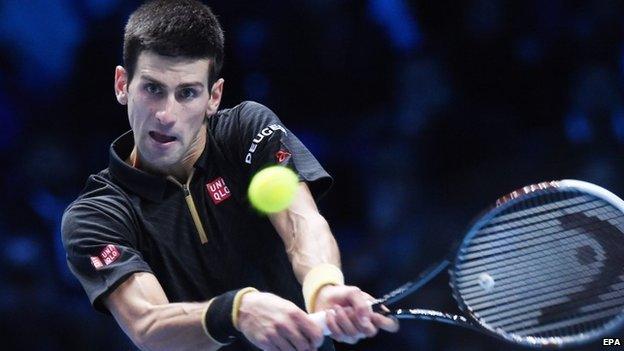
Novak Djokovic is currently number one in the ATP men's rankings
Breaking into the world of professional tennis is an uphill battle for up-and-coming players, and for sportswear firms looking to enter such a competitive arena the challenge is no less intense.
That makes the presence of Uniqlo at the top of men's global tennis all the more unusual - the Japanese firm is a High Street leisure brand rather than a traditional sports manufacturer.
It occupies the same space as the likes of Next and Gap rather than Nike and Adidas.
So how did this fashion company come to provide playing kit for two of the main contenders for the forthcoming Australian Open - world number one Novak Djokovic and fifth seed Kei Nishikori?
'Door opened'
As the firm's global marketing officer Jorgen Andersson explains, the company's entry into the sport came through its signing of Japanese wheelchair tennis sensation Shingo Kunieda as their first sports ambassador in 2009.
"The door opened to us with Kunieda," he says. "Since then our sports partnerships have expanded as the company has grown."
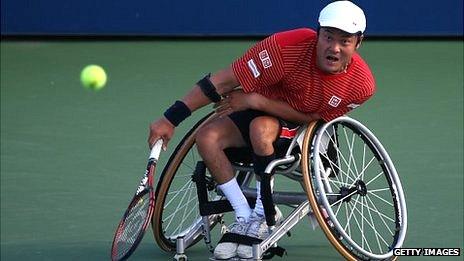
Shingo Kunieda was the wheelchair tennis champion at the US, French and Australian Opens in 2014
The objective, he says, has been to strengthen the company's global brand image, using the appeal of tennis to reach a wider consumer audience, including the important youth market.
Also, on a practical note, the tennis outfit of polo shirt and shorts were products that Uniqlo already felt at home with.
'Learning curve'
"We want to be the number one apparel wear brand in the world, and for us tennis seemed a perfect match," says Mr Andersson, pointing to the fact that it is a global and aspirational sport, played by males and females of all ages.
"It has been a learning curve as we have added [further] tennis ambassadors, first Kei Nishikori and then Novak Djokovic, but we feel our sports partnerships are thriving."
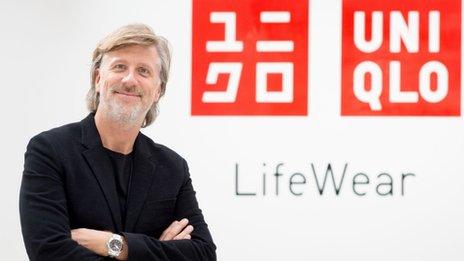
Jorgen Andersson has decades of experience in clothing retail
What Mr Andersson calls an "important breakthrough" came in the US Open last September, when Djokovic and Nishikori contested their first Grand Slam semi-final, with the Japanese player going on to ultimately lose in the final to Marin Cilic.
"I think we created some very positive feelings among tennis fans, to see not just another Nike, Adidas, Puma on court," Mr Andersson says.
Nishikori opportunity
Uniqlo, which was founded in 1984 with its first store in Hiroshima, signed Nishikori in 2011 when the Japanese competitor was very much a player of potential rather than the top player he is now.
"At the time Kei was much further down in the ranking than he is today," says Mr Andersson.
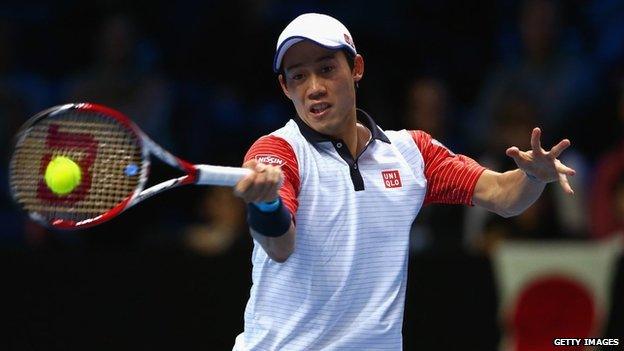
Uniqlo signing Kei Nishikori has helped promote the popularity of tennis in Japan
Then in 2012 they signed Novak Djokovic after he cancelled his deal with Italian firm Sergio Tacchini, external following numerous problems.
Uniqlo says a lot of negotiation took place before these deals were signed.
As well as its tennis players, the company also provides the kit for leading Australian golfer Adam Scott and is the title sponsor of the International Tennis Federation (ITF) wheelchair tennis tour.
Athlete criteria
Asked whether they would sign any more athletes, Mr Andersson says they are keeping a close eye on the sports sponsorship market, "monitoring what sort of deals are taking place out there".
"Our approach right now though is to wait and see," he says.
The company is always looking at sportspeople whose ability, personality and mentality "would make them good Uniqlo ambassadors".
"We have an ambition to grow in the female segment of the market, and as part of that strategy we are looking for suitable female sportspeople who might help us with our approach," he adds.
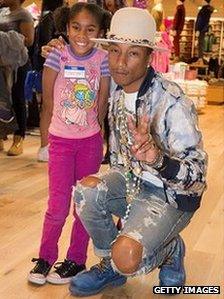
Singer Pharell Williams at a Uniqlo CSR event
Any new addition, male or female, would need to have the characteristics which Uniqlo says it has found in Djokovic and Nishikori - namely honesty, modesty, hard work, focus and an ability to handle success with gratitude.
An interest in the design of the playing kit they will be wearing might also be a useful advantage. Mr Andersson says that both Djokovic and Nishikori have input into the fabrics used in their playing kit, as well as the cut, colour and more.
Fashion trends
Replica wear based on the products that is designed for its four sportsmen is then made available in Uniqlo stores around the world.
And the Swede says that the crossover from High Street leisurewear (or "LifeWear", to use Uniqlo's phrase) into sport is not as unusual as it might appear.
"I like to think that [our] LifeWear includes sportswear," says Mr Andersson, who spent nearly two decades at multinational clothing chain H&M, and has also worked for clothing and homeware firm Esprit Holdings.
"We want to blur the boundaries between sportswear, LifeWear, workwear. Nowadays people wear jeans to work, or yoga pants when they go out to eat."
Indeed, the firm is not the only High Street retailer expanding into tennis - H&M has kitted out Czech star Tomas Berdych for the past two years.
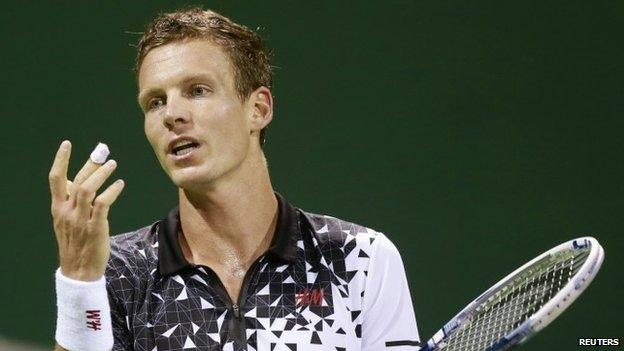
World number seven Tomas Berdych signed a deal with High Street retailer H&M in January 2013
Uniqlo now has a presence in 17 countries, with Belgium the latest addition. Its overseas sales are surging, especially in China and South Korea, and it aims to open 100 stores in China every year over the next decade. Uniqlo owner Fast Retailing's recent first-quarter results, external beat expectations, with profits up 64%.
One cloud this week, though, was when a report raised questions about conditions, external at two of its Chinese suppliers. In response, the company promised to address the issue, external.
Mr Andersson says corporate social responsibility (CSR) is a big element of what the firm does, and points to the Clothes for Smiles campaign, backed by Djokovic, which helps children's charitable projects.
'Super-positively surprised'
Although Djokovic and Nishikori are doing so well, was there ever a time when it looked a risk going into professional tennis?
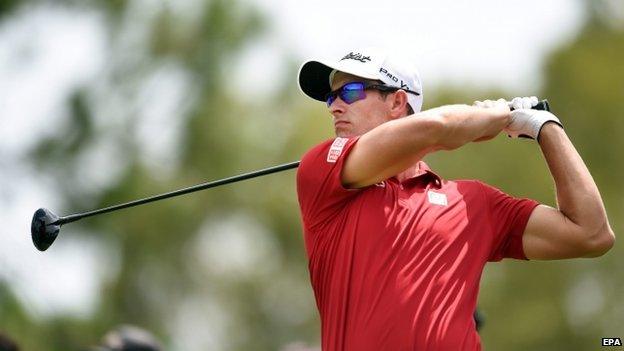
Australian golfer Adam Scott is also a Uniqlo ambassador
"We always thought it would pay off. We thought our moves would succeed," Mr Andersson says.
"Everyone is super-positively surprised by how our partnerships have been so successful - we are very happy with the players and their success."
In fact, replica wear introduced in Uniqlo stores in the US just before the pair met in the US Open sold out faster than the firm expected.
The company has stores in Melbourne and Sydney, and a successful Australian Open, which is increasingly being rebranded as an Asia-Pac Open, could bring benefits at the cash tills again.
And with further expansion planned it seems there is still a continuing role for its tennis sponsorship.
"We cannot say we are in it for 25 years or suchlike, because we simply don't know, but our approach is definitely longer term than shorter term," says Mr Andersson.